Guarantee Game: Messier's iconic vow turns 30
It would become one of the most iconic statements ever made in hockey.
Thirty years ago, such news wasn't delivered by social media or push alert, but the old-fashioned way: newspaper. That's how Nick Kypreos remembers reading it. The Rangers' bus had just pulled up to Brendan Byrne Arena in New Jersey to deliver the team to its date with destiny: a win-or-go-home Game 6 showdown against the Devils in the 1994 Eastern Conference Final. The Rangers, who finished the regular season atop the standings, just endured back-to-back losses to the underdog Devils and were now facing elimination on the road.
Kypreos sat beside defenseman Brian Leetch on the drive to New Jersey and the two were the last off the bus. "One of the seats in the front of the bus had a copy of the New York Post," says Kypreos, and on the back pages were the words that would go down in hockey history: "We'll win tonight," a bold prediction issued by captain Mark Messier.
"Brian stopped, looked at the paper, then turned around, looked at me, and said, 'I guess we're going to win tonight,'" says Kypreos. Those three words went viral, the momentum propelling the Rangers to a pivotal win that paved the way for the franchise's first Stanley Cup in 54 years.
"At the time I thought, 'That's something Mark would seldom do,'" remembers former Rangers forward Craig MacTavish. But there it was in black and white, read all about it. "He felt so strongly in the team's ability to bounce back and win Game 6, and not only the team's ability, but his own. It was a pretty courageous, ballsy thing to do."
Thirty years later, the Rangers again face a tough road Game 6 in Round 3 of the playoffs. They're down 3-2 to the Panthers, and remain two wins from the Cup Final for the first time since 2014, in their quest to bring New York its first title since 1994. While there will never be another Messier, captain Jacob Trouba is flanked by Igor Shesterkin, Vincent Trocheck, Artemi Panarin, Chris Kreider, and Mika Zibanejad, who lead today's squad. These Rangers have a chance to create their own iconic postseason moment - if they can rise to the occasion like their predecessors.
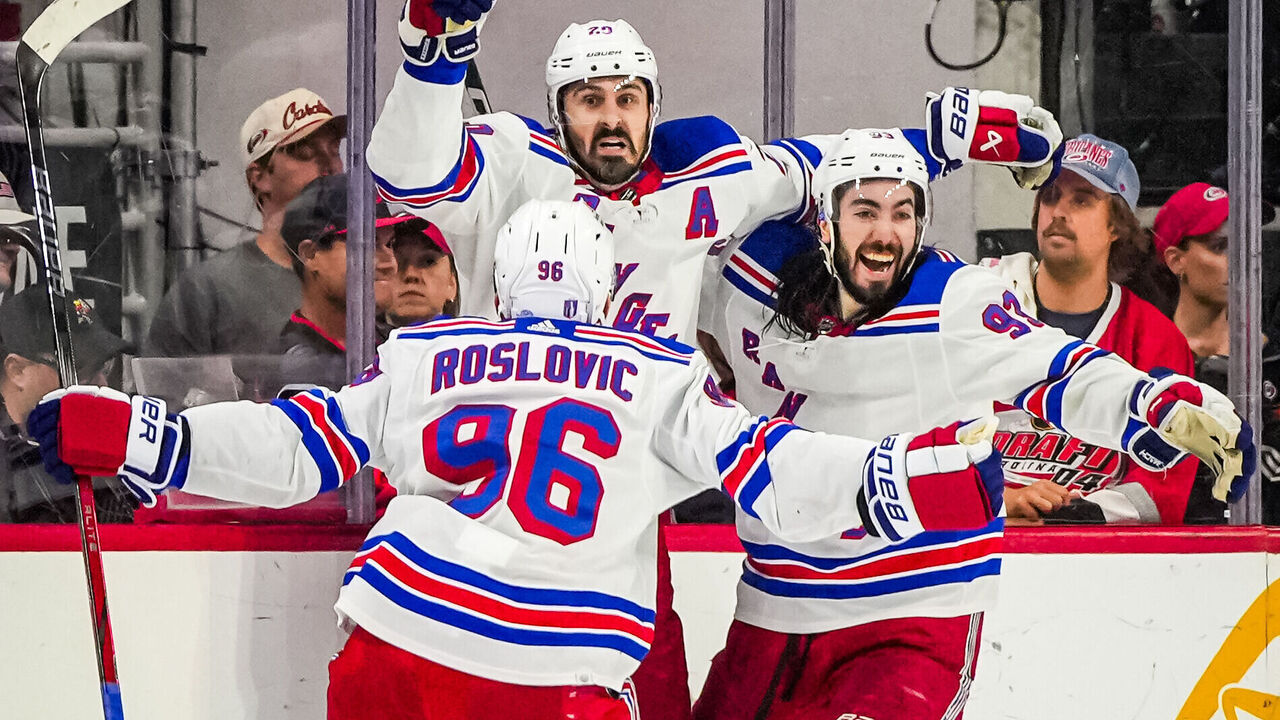
Paving the way for a storyline
By the time Messier's Rangers faced the Devils in 1994, the fan base was desperate for a championship - but it wasn't always that way. When the Rangers joined the league as an expansion team in the 1926-27 season, they immediately established themselves as one of the era's most dominant squads, winning the Stanley Cup over the Montreal Maroons in their second season and again in 1933 and 1940.
But those heady times didn't last, and the team's subsequent poor performance was so incredulous that it led some to consider the franchise cursed.
One of the more superstitious theories claims that in the 1939-40 season, the mortgage on Madison Square Garden was repaid and its papers burned in the Stanley Cup. In retribution for desecrating the sport's holy grail, the Rangers were sentenced by the hockey gods to indefinite bad luck. Others agree the curse was real but cite Red Dutton as the cause. The disgruntled former coach and general manager of the New York Americans, which folded during World War II, was said to hold a grudge against the Rangers for their staying power.
Whether the cause was mystical or pragmatic, the Rangers after 1940 endured one of the longest championship droughts in NHL history. Tantalizing near misses in 1950 and 1979 added insult to injury.
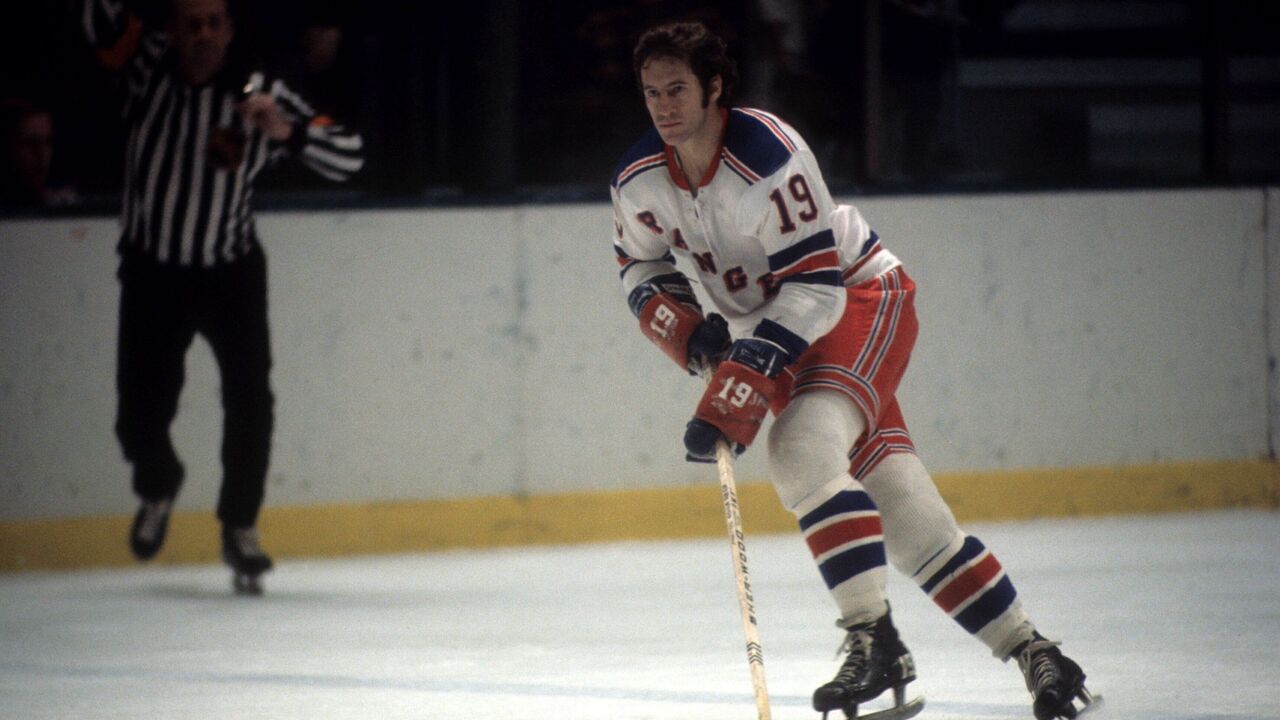
"The Rangers' theme was that they were losers," says Jerry Eskenazi, who covered the team in the late 1960s and early 1970s for The New York Times. Back then, the club was essentially irrelevant in the New York sports landscape. Eskenazi remembers his first assignment covering the team: "The sports editor looks up the date book, what was going on that day, and he says, 'This is something interesting: the Rangers open the season today.'" The Times' sports desk didn't know the local hockey team's season was starting, nor had it scheduled a reporter to attend the opener.
Occasional flashes of promise in the following decades weren't enough to erase the impact of the Rangers' continued failure to win another championship. "Even though they might have won games and were competitive, there was always that harking back to 1940," says Eskenazi.
1940 wasn't just a theme; it became a chant. Opposing fans would use it to taunt each generation of Rangers players and fans through the 1970s, 80s, and into the 1990s as the team kept falling short.
"They got close in the early 1970s," says John Kreiser, whose book, "The Wait Is Over: The New York Rangers and the 1994 Stanley Cup," chronicles the legendary Cup run. "They had some good teams in the 80s, but the Islanders were always better, or the Oilers were always better."
In 1989, the Rangers hired general manager Neil Smith. "He was running Detroit's minor-league system after he left the Islanders. They hired him as much because they couldn't get somebody who was a bigger name to take the job," Kreiser says. But Smith made an immediate impact. "In his first year they won the division title, which was the first time they'd finished first, at any level, since 1942," Kreiser says.
The tides turned in earnest in 1991 when the Rangers acquired star center Messier in a blockbuster trade with the Oilers for Bernie Nicholls, Steven Rice, and Louie DeBrusk. Messier was subsequently joined by ex-Oilers teammates Jeff Beukeboom (included in the trade), Glenn Anderson, Kevin Lowe, MacTavish, Adam Graves, and Esa Tikkanen - a sizeable portion of the Oilers' Cup dynasty.
"One of the things that I remember Neil telling me was that he really felt there was value, because when he looked at that roster there were, like, seven guys from the Oilers dynasty on there. He was very adamant that was important because you needed guys who knew how to win," Kreiser says. "He wanted Messier and Lowe and MacTavish to pump some winning life in there."
The move didn't go unnoticed among rivals. "We scoffed at the fact they were basically raiding the Oilers for these guys," says legendary Devils broadcaster and hockey historian Stan Fischler. "Gretzky was the ultimate artist, but Messier, for his time, was the most menacing," he says.
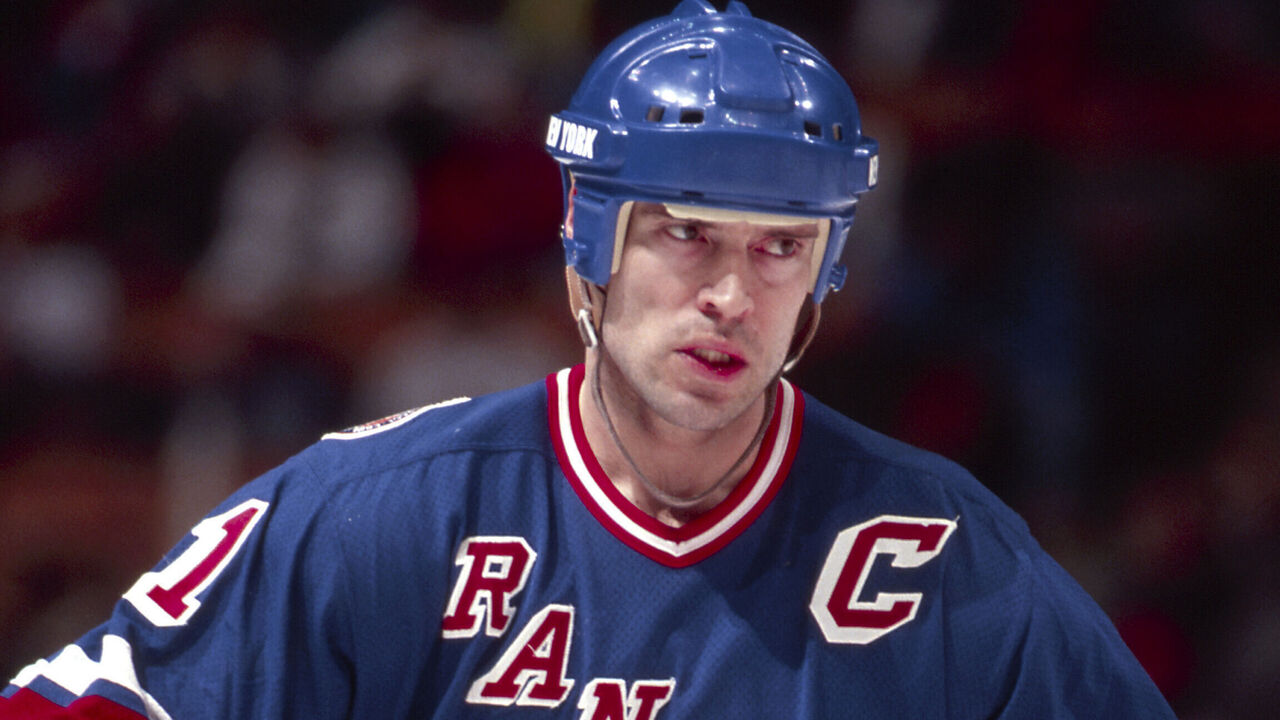
The Devils were about to see just how menacing "Moose" could be.
Rising to the occasion
Anyone watching Game 4 of the 1990 Campbell Conference Final between Chicago, which was leading the series 2-1, and Edmonton knew Messier was not to be trifled with. The Oilers narrowly escaped the first round, clawing their way back from a 3-1 deficit. Now, they were in a similar situation, in a must-win game against the Blackhawks.
"To me, that was the best game (Messier) ever played," MacTavish says. "He had a hat trick, and he was just a man possessed. We knew we couldn't go down 3-1 again. He single-handedly broke the spirit of that whole organization in Game 4."
A 4-2 routing helped the Oilers gain the momentum necessary to win three straight and eliminate the Blackhawks. They beat the Bruins in the Cup Final in five games - without Wayne Gretzky.
"For me, 1990 was pretty special to win without Wayne, which is no small accomplishment," MacTavish says.
As for Messier: "He reached another level of superpower there," says MacTavish.
It was a superpower he'd call upon again four years later, this time as Rangers captain.
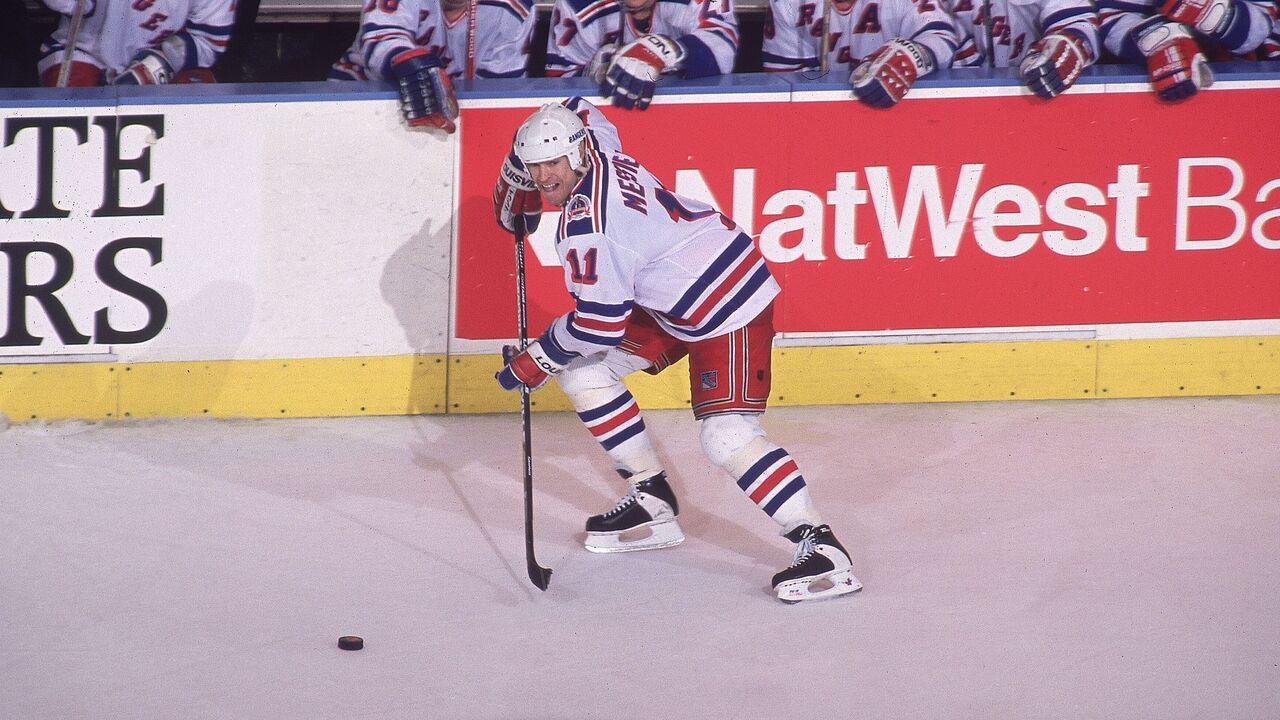
In 1994, the Rangers went 52-24-8 - the best record in the NHL. If there was a year to break the curse, this was it. "The moment you became a New York Ranger, you inherited that heartache," says Kypreos, who now co-hosts Sportsnet's podcast, "Real Kyper and Bourne."
"The sense of urgency for us to win that particular year was never lost on us," he adds. "I got traded at the beginning of the season and it took all of 30 seconds for me walking down Fifth Avenue for people to come up to me and say, 'You know, we got this drought since the 1940s.'"
Capitalizing on that urgency, the Rangers swept the Islanders in the first round and then ousted the Capitals in five games. Waiting for them in the conference finals were the Devils, who finished second overall in the league at 47-25-12. The Devils might have finished first overall - if they weren't swept by the Rangers in six regular-season games.
"The Devils were a younger team," Fischler says. "Marty Brodeur was in his second year in goal. They surprised a lot of people. They started the series as the underdogs."
The best-of-seven opened with a 4-3 double-overtime Devils win, but the Rangers fought back to take a 2-1 series lead. Then, the Devils answered with some firepower of their own, handing the Rangers back-to-back losses, limiting them to one goal in each game, to take a 3-2 lead back to New Jersey.
"They looked like they might pull off an upset," Fischler says.
The nervousness rippled throughout the fan base. "The fans came into Game 6 looking at, 'Well, if we lose, we're done. We've wasted another really good chance to end 54 years of misery,'" says Kreiser.
The players felt the pressure, too. "The stakes were extremely high," says MacTavish.
And that's when Messier guaranteed the win.
Some say his words were overblown by the New York press. "Did Mess really guarantee a win or did the writer set it up for him?" asked Fischler.
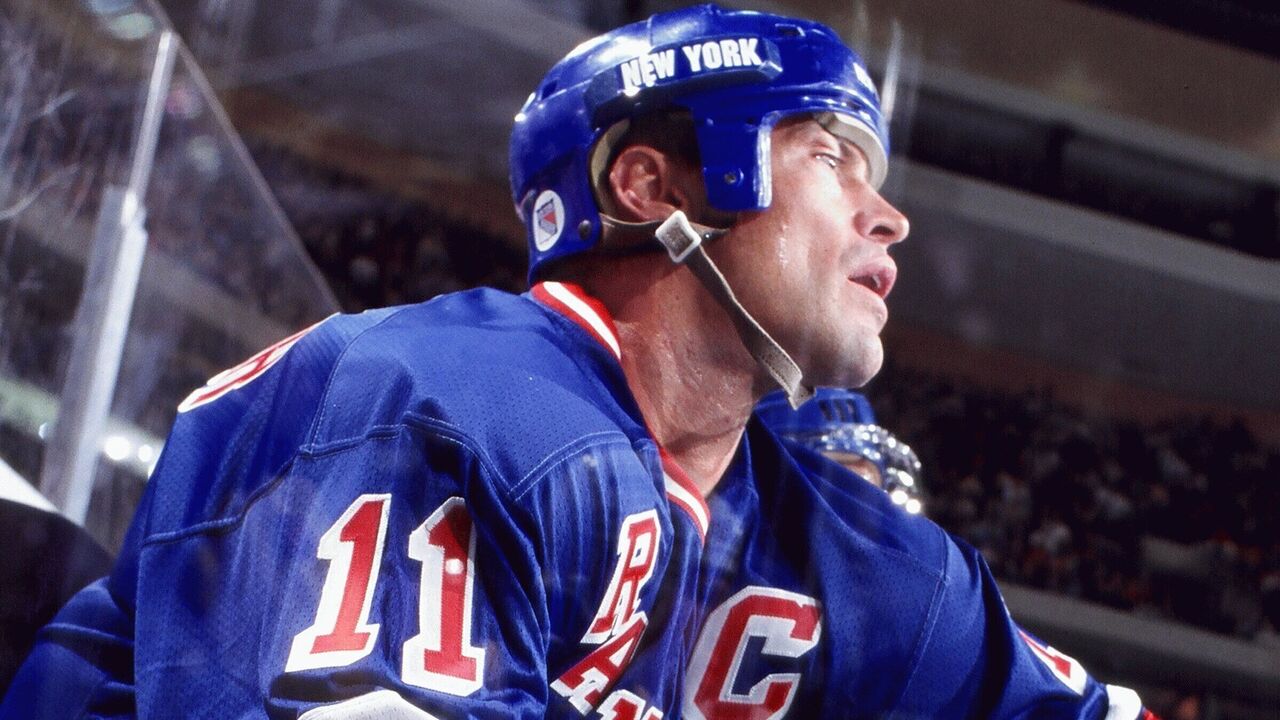
Messier's exact words were: "We can win and will win." But he was savvy enough to know what the press would do with that quote. "He knew they were going to run with it pretty hard, and he agreed to it," says MacTavish.
"Mark told me 20 years later that part of the reason he did it was to keep his guys' spirits up," says Kreiser.
Making a claim is one thing; backing it up is something else entirely. When the puck dropped to start Game 6 on May 25, 1994, it looked like Messier might be stymied. The Devils overwhelmed the Rangers within the first five minutes with three two-on-one chances and notched eight of the game's first nine shots. New York managed just nine shots on goal in the first, none of them finding the back of the net. "They were taking it to us pretty good, I remember," says MacTavish.
"The Devils just totally dominated the first two periods," says Kreiser. "They were up 2-0. And the only reason it wasn't 6-0 was (goaltender) Mike Richter."
Ultimately, Richter faced 26 shots in the first two periods, letting in two. Decent numbers, but it was hardly guaranteed he'd stay in net. Coach Mike Keenan pulled him in Game 4 under similar circumstances, opting for backup Glenn Healy.
"Everybody in the building and throughout Manhattan was probably thinking, 'When's he going to pull Richter?'" Keenan later told his autobiography writer Scott Morrison. Their book, "Iron Mike: My Life Behind the Bench," releases in October. But according to Morrison, Keenan wasn't even considering pulling Richter.
"'(Richter) kept us in that game, he kept us in that period, we could have been down easily by four or five goals. So, I stuck with him and hoped that the team would feed off of that kind of response and react accordingly,'" Morrison remembers Keenan saying.
That turned out to be prescient. "Without Richter, that game wouldn't have been what it was," says Healy.
"That's what goaltending means at this point in the season," says Kypreos. "Goalies are the only ones who play the entire game on the ice."
"His outstanding performance is what kept us in the game and allowed (Messier) to do what he did in the third period," says Healy. "Richter's goaltending in Game 6 was an exquisite performance."
It wasn't until late in the second period when the Rangers got on the board, on a goal by Alex Kovalev assisted by Messier. It didn't just change the momentum; it changed everything.
"It was that Kovalev goal," says Fischler. "Everything was nice and then suddenly this guy is coming down the right side and he beats Brodeur.
"I did interviews between periods. And I had Bernie Nicholls on for the Devils. Not only myself but others who heard the interview were convinced by his body language and things he said that the Devils were fading, they were tiring, they were going to lose the lead. He seemed resigned to the fact the third period was not going to favor the Devils. Nicholls was a very savvy guy, he knew that things weren't going to be too good up ahead."
That's when Messier found his other superpower level - the one he accessed in Chicago in 1990. Early in the third period, he snuck a backhander by Brodeur, tying the score at 2-2. Messier secured the go-ahead goal, too, in the middle of the frame, off a rebound. He bagged the insurance goal late, shorthanded into an empty net.
"I was ecstatic for the win," MacTavish says. "Secondly, I was in awe of the prediction - and then to back it up with a hat trick?"
"I don't think anybody in New York had ever seen something like that, where a guy puts his neck in a noose and then delivers like that," Kreiser says. "People were shaking their heads - happily."
The series went back to MSG for Game 7, which the Rangers won 2-1. They'd play one final Game 7 in the next round, beating the Vancouver Canucks at home to secure their first Stanley Cup in 54 years.
The guarantee's legacy
"You know, over my career, I can isolate specific games that are never, never forgotten," says Fischler, who speaks as if Game 6 was played a week ago. Speaking with him, it's clear: this is one of those games.
"There were a lot of storylines going. And it was very, very emotional," he says.
Perhaps it's the Rangers-Devils rivalry that'll live the longest - even after the legend of the Guarantee Game fades into history. "The rivalry is now part of the fabric of that area," Kypreos says. "It stands the test of time."
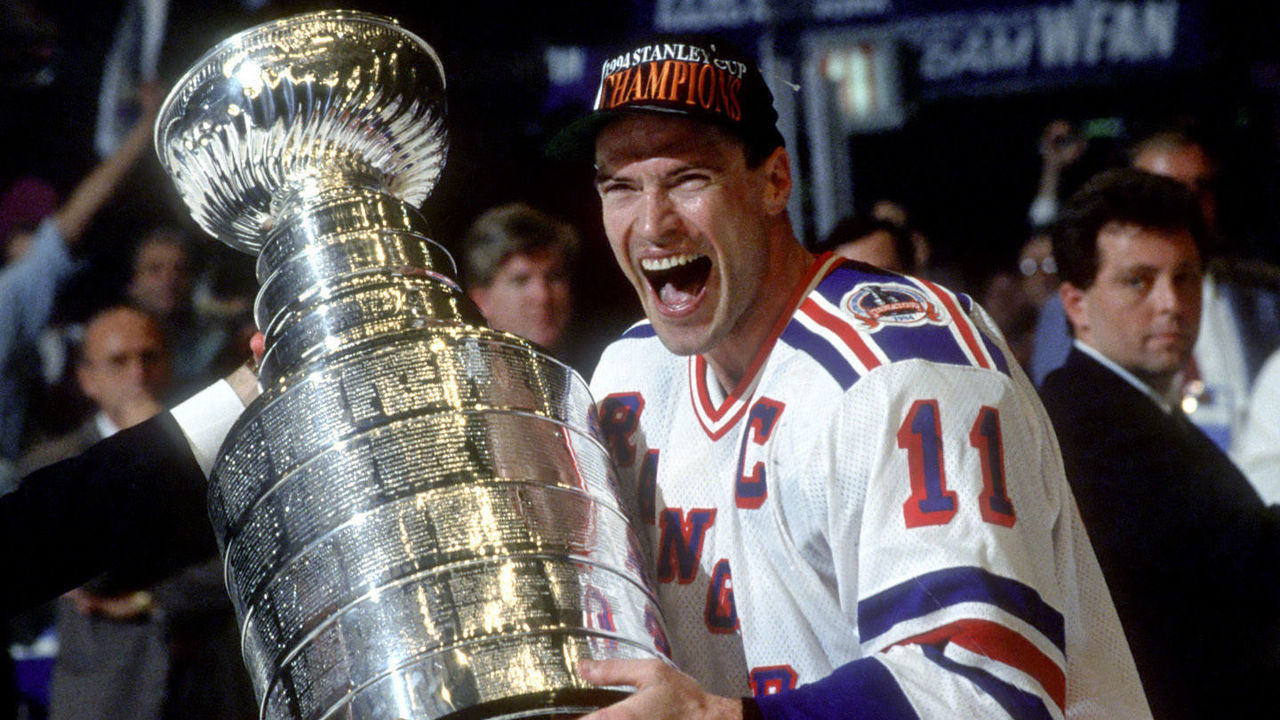
So far, no cohort of the Rangers has been able to top - or even match - what Messier's squad did in 1994. "They haven't won since then," Kreiser says. "That's one of the things that stretches out the story of the Guarantee Game."
It's unlikely we're getting a Game 6 guarantee from this year's Rangers, and their task remains formidable. "What Messier did is what separates the good from the iconic - absolutely iconic," says MacTavish. "They make it happen when it needs to happen."
But these Rangers can take solace: It's not impossible. Messier proved that.
Jolene Latimer is a features writer at theScore.
HEADLINES
- Serge Savard: Hutson 'probably most talented' Habs player since Lafleur
- Lightning's rink renamed Benchmark International Arena
- Hurricanes owner Dundon agrees to buy Blazers, reportedly won't move team
- Report: Arbitrator sides with Flyers over Johansen's contract termination
- Kraken sign Evans to 2-year contract